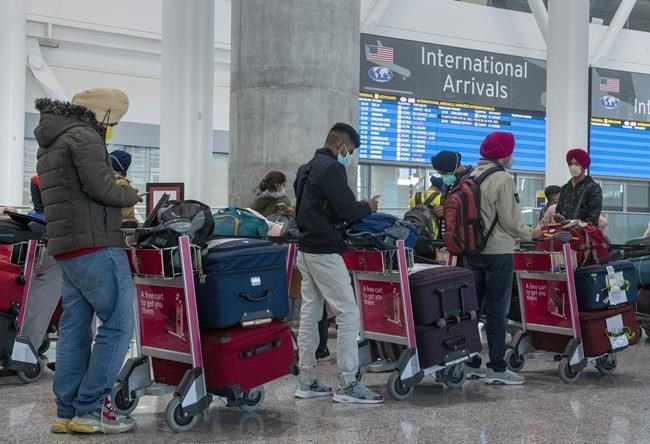OTTAWA — G7 countries have agreed that resuming international travel once the pandemic recedes will require a co-ordinated approach to COVID-19 testing and recognizing whether passengers have been vaccinated, Transport Minister Omar Alghabra said Wednesday.
"We have committed to working on a common set of principles to guide the resumption of international travel when it's safe to do so," Alghabra said in a statement following his virtual participation in the G7 transport ministers' meeting.
"At the centre of this effort must be a co-ordinated approach for testing and a common platform for recognizing the vaccinated status of travellers," Alghabra said.
"As we work to build back better, the establishment of a system that will protect our privacy and personal information, and that will be accessible, fair, and equitable is imperative," he continued in the statement.
"We must apply lessons learned from innovative technologies to identify long-term, sustainable solutions and expand upon them globally."
Alghabra said the transport ministers of G7 countries have a leading role to play in advancing a new global framework for international travel that will be key to safely resuming the free movement of both people and goods around the world.
The G7 includes the United Kingdom, the United States, Canada, France, Germany, Italy, Japan, along with the European Union.
Immigration Minister Marco Mendicino said his department is involved in discussions with the World Health Organization and the International Civil Aviation Organization around setting a universal standard to promote the safe travel of those who have been vaccinated.
Speaking to a virtual news conference Wednesday, Mendicino said the government is working to put in place a system to recognize people who have been vaccinated.
"We're continuing to work towards a world in which there will be a system in place to recognize passports," he said. "We are certainly advancing that work both domestically as well as abroad."
Prime Minister Justin Trudeau confirmed Tuesday that Canada may require international travellers to prove they were vaccinated against COVID-19 before they can enter the country.
Trudeau said the federal government hopes to align its policy on the issue with its international allies, but he also said Canada might require American visitors to prove they were vaccinated against COVID-19 before entering the country regardless of whether the United States will require Canadians to do so or not.
"Our responsibility is to do everything necessary to protect Canadians, and we are going to do that, even if there isn't automatically symmetry with other countries,'' Trudeau told a news conference.
Meanwhile, Foreign Affairs Minister Marc Garneau said he and his G7 counterparts discussed global issues that threaten to undermine democracy, freedoms and human rights.
Garneau said the G7 foreign ministers' meeting was an opportunity to breathe new life into some of Canada's priorities, including ending arbitrary detention in state-to-state relations.
Canada and a coalition of 57 other countries offered support in February for a new international declaration denouncing state-sponsored arbitrary detention of foreign nationals for political purposes.
"We're very, very pleased with the very strong support that we received from the G7," Garneau told a virtual news conference, saying that "global momentum continues to build" on the declaration.
China detained two Canadian citizens, Michael Kovrig and Michael Spavor, in December 2018, a few days after Meng Wanzhou, an executive of the Chinese tech company Huawei, was detained in Vancouver at the request of the United States.
Garneau said the G7 foreign ministers called on China to respect human rights and fundamental freedoms and expressed their deep concerns about the human rights violations and abuses in Xinjiang, Tibet and Hong Kong.
Garneau said the ministers also discussed the need to fight the growing problem of misinformation around the world.
The G7 foreign ministers' meeting, which took place in London is the first major in-person diplomatic gathering since the pandemic began. It is also the first gathering of G7 foreign ministers since 2019.
Garneau said the delegation from India didn't participate in face-to-face meetings after two of its members tested positive for COVID-19.
"I have been tested five times in the last two and a half days, so testing is extremely rigorous," Garneau said.
"We are essentially living within a bubble, very restricted in terms of movement, going from the hotel to the meetings and then returning."
He said he will go through the normal protocol for all returning Canadians when he returns home later Wednesday, including doing PCR COVID-19 tests before and after boarding his flight and staying in a quarantine hotel for three days.
This report by The Canadian Press was first published May 5, 2021.
——
This story was produced with the financial assistance of the Facebook and Canadian Press News Fellowship.
Maan Alhmidi, The Canadian Press



